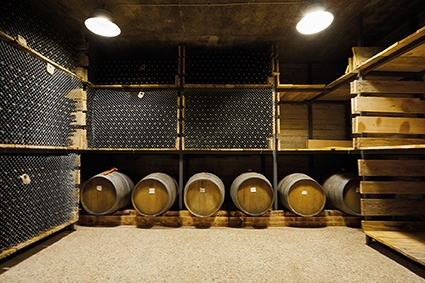Sazano Wine Cellar – Tradition Continued by the 6th Generation
Fifty kilometers from Kutaisi, in the village of Upper Sazano of the Tergola region, you will discover a wine cellar and family boutique hotel. Sazano Wine Cellar was launched just a year ago, but its history is much longer as it counts two centuries of tradition, being located on the family estate of Levan Tchanturidze.
Levan is the representative of the 6th generation of the family, continuing the family wine-making traditions. He decided to return to Sazano in 2017 and restore and revive the ancient tradition of viniculture. His co-founder Tato Giorgadze is a childhood friend whose ancestors were also actively engaged in wine production.
Saving, reviving and planting unique western and Imeretian wine varieties, including Krakhuna, Otskhanuri Sapere, Tsitska, Aladasturi and Ojaleshi, and launching traditional wine production from them, is the goal of Sazano Wine Cellar. Aside from visiting the cellar, you can buy Sazano wines in the 8,000 Vintages store, in the newly-opened Rike Complex, Doki store at 30 Kote Apkhazi Street, as well as restaurants House N11 and Piano.
The sales chain is actively expanding, and it is planned to widen the geographic area. Sazano wine is not yet exported; however, the target markets, including the USA, Canada, Japan and Poland, are being studied. Exporting products to said countries is scheduled to take place by the end of this year, whereas assimilation to the markets of the regions of the Baltics and Scandinavia will kick off next year.
Development of wine and gastro-tourism represents a major direction for Sazano Wine Cellar. It is possible to taste 11 rare wine varieties, premium-quality chacha, as well as a wide range of local specialties. The majority of courses are made of products harvested in the gardens and greenhouses of Sazano. Bread, prepared in a special oven, and traditional Imeretian cheese can be tasted on site. Guests are also welcome to see the working processes.
Hotel Sazano is a guest house with an original style, concept and design. “In 2019, we launched a 5-room boutique hotel in our 20th century building. The exterior has undergone restoration, reflecting various eras. An Imeretian oda-house is to be added to the complex in 2020, which will be fully arranged in accordance with the solar system and will present the ethnography of Imereti of the 19th and 20th centuries. Our main aim is for guests to feel the Imeretian hospitality and the authenticity of the ambience. Along with the hotel and wine cellar, our team also actively works on gastro-tourism and cultural tours. We aim to give new life to the forgotten traditional dishes of Imereti and remind the nation about the important and deep culture of this region,” state the Sazano founders.
The future plans are related with the expansion of the vineyard and enterprise development. At this stage, the vineyard stretches across three hectares, but it is planned to triple the size within the next two years. While the annual throughput currently amounts to 60,000 bottles of wine, this will grow to 100,000 by 2020.
The vision of the Sazano team is ambitious: “Each visitor to the Sazano Wine Cellar and hotel will feel special, discover new tastes, try our exclusive stored wines and enjoy the environ. We do all of this through high quality service. Service and hospitality are major priorities for us and are constantly controlled and monitored. All our products are local and natural. In addition, by reintroducing almost abandoned grape varieties, we try to accentuate quality, not quantity. Krakhuna, Otskhanuri Sapere and a number of other wine varieties were felled last century due to their weak harvest tendencies; yet their quality is certainly exceptional. We call on future generations to get a higher academic education in the winemaking direction, as there are lots of wine varieties in need of protection and preservation, including Kachichi, Shavkapito, and Dzelshavi. Through academic knowledge and ancient traditions, we will definitely achieve our goal.”
By Salome Kushashvili, Translated by Ketevan Kvaratskheliya












